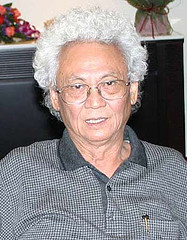Vous pouvez contribuer simplement à Wikibéral. Pour cela, demandez un compte à adminwiki@liberaux.org. N'hésitez pas !
Steven Cheung
| Steven Cheung | |||||
| Économiste | |||||
|---|---|---|---|---|---|
| Dates | 1935- | ||||

| |||||
| Tendance | École de Chicago | ||||
| Nationalité | |||||
| Articles internes | Autres articles sur Steven Cheung | ||||
| Citation | |||||
| Interwikis sur Steven Cheung | |||||
Steven N. S. Cheung, né le 1er décembre 1935 à Hong Kong, est un économiste institutionnel et politique dans la mouvance de l'école de Chicago. Il a été fortement influencé par les travaux de Ronald Coase. Il a combattu la théorie des économistes interventionnistes prétendant que l'État est nécessaire dans l'économie en raison de différents facteurs : externalité, coût social, non-excluabilité. Dans ses différents travaux il a démontré que ces arguments interventionnistes sont fallacieux. Il est devenu incontournable dans la compréhension de la théorie des biens publics.
Après une carrière académique aux États-Unis, Steven N. S. Cheung est retourné à Hong Kong en 1982 où il a participé à l'élaboration des premières réformes chinoises (voir Cheung, 1986). Pendant de nombreuses années, il a écrit des chroniques régulières dans le Hong Kong Economic Journal et dans d'autres journaux, qui ont été très influentes auprès de certains membres du public chinois. Dans ces articles, il a présenté des idées libérales comme la théorie des prix, par l'intermédiaire d'histoires souvent intelligentes et attrayantes pour les lecteurs de base du journal qui n'avaient jamais entendu parler d'économie libérale.
Steven Cheung démontre en 1973 (dans La fable des abeilles, un clin d'œil à Bernard Mandeville) que certaines idées canoniques de l'économie néo-classique sont erronées. En fait, dans la théorie économique, certains cas de non-excluabilité des biens publics n'existent pas. Les apiculteurs ont parfaitement trouvé une solution facile de faire payer les gens pour leurs services. Ronald Coase, en 1974[1], démontre que la situation pour le phare maritime est également un faux exemple de non-excluabilité. Plus généralement, ces auteurs font valoir que le diagnostic de « défaillance du marché » ne peut pas être obtenu dans la théorie économique formalisée et abstraite, mais seulement dans le contexte d'alternatives institutionnelles existant dans le réel. Cette analyse institutionnelle comparative corrobore celle d'Harold Demsetz en 1969 [2] qui remet en cause l'article de Kenneth Arrow de 1962 [3].
Notes et références
- ↑ Ronald Coase, 1974, The Lighthouse in Economics, Journal of Law and Economics ,17:22, October, pp357-376
- ↑ Harold Demsetz, 1969, Information and Efficiency: Another Viewpoint, Journal of Law and Economics 12, pp1-22
- ↑ Kenneth Arrow, 1962, Economic Welfare and the Allocation of Resources to Invention, In: Richard R. Nelson, dir., The Rate and Direction of Inventive Activity: Economic and Social Factors, Princeton: Princeton University Press
Publications
- 1968, "Private Property Rights and Sharecropping," Journal of Political Economy 76 (December 1968): 1107-22;
- 1969,
- a. Transaction Costs, Risk Aversion, and the Choice of Contractual Arrangements, Journal of Law and Economics, April, Vol 12, pp. 23-42
- b. The Theory of Share Tenancy, University of Chicago Press: Chicago
- 1970, "The Structure of a Contract and the Theory of a Non-Exclusive Resource, Journal of Law and Economics, Vol 13, pp49-70
- 1972, ‘The Enforcement of Property Rights in Children, and the Marriage Contract’, 82 Economic Journal, 641-657
- 1973, The Fable of the Bees: An Economic Investigation, Journal of Law and Economics, Vol 16, pp11-33
- Repris en 1988, In: The Theory of Market Failure, Tyler Cowen, Dir., Fairfax, VA, George Mason University Press, pp279-304
- 1974, A Theory of Price Control, Journal of Law and Economics, 17, pp53–72
- 1975, "Roofs or stars: Stated intents and actual effects of a rents ordinance", Economic Inquiry, 13, pp1–21
- 1978, "The Myth of Social Cost", London: Institute of Economic Affairs
- Traduction en espagnol en 1980, "El mito del Costo Social", Instituto de Economía de Mercado. Unión Editorial. Madrid
- 1982,
- a. "An economic theory of institution change", In: "Will China go 'capitalists'?", Hobart Paper n°94. London: Institute of Economic Affairs
- b. "Will China Go Capitalist ?", London: Institute of Economic Affairs
- 2de édition avec "Postscript" en 1986, "Will China Go Capitalist ?", London: Institute of Economic Affairs
- 1986, "China in Transition: Where Is She Heading Now ?", Contemporarv Policy Studies, Vol 4, n°4, October
- 1983, "The Contractual Nature of the Firm" Journal of Law and Economics 26:1–21
- 1987,
- a. Common property rights, In: John Eatwell, Murray Milgate et Peter Newman, dir., The New Palgrave: A Dictionary of Economics, The MacMillan Press Limited
- b. Economic organization and transaction costs, In: John Eatwell, Murray Milgate et Peter Newman, dir., The New Palgrave: A Dictionary of Economics, The MacMillan Press Limited
- c. Ronald Harry Coase, In: John Eatwell, Murray Milgate et Peter Newman, dir., The New Palgrave: A Dictionary of Economics, vol. 1, New York: Stockton Press, pp455–457
- 1989, "Privatization vs. Special Interests: The Experience of China's Economic Reforms", Cato Journal, Vol 8, n°3, Winter, pp585-596
- repris en 1989, "Privatization vs. Special Interests: The Experience of China's Economic Reforms", In: James A. Dorn, Wang XI, dir., "Economic Reform in China. problems and Prospects", Chicago: Chicago University Press, pp21-32
- 1992, On the New Institutional Economics, In: Lars Werin and Hans Wijkander, dir., Contract Economics, Blackwell
- 1998, "The Transaction Costs Paradigm", Economic Inquiry, 36 (4), pp514–521
Littérature secondaire
- 1992, Ronald Coase, Comment on Cheung [On the New Institutional Economics], In: Lars Werin and Hans Wijkander, dir., Contract Economicsn Blackwell, Oxford and Cambridge
- 2007, Bingyuan Hsiung, Ronald Coase's Englishness and Steven Cheung's Chineseness, Pacific Economic Review, 12:2, pp171-187
| Accédez d'un seul coup d’œil au portail économie. |
| Accédez d'un seul coup d’œil au portail des grands auteurs et penseurs du libéralisme. |